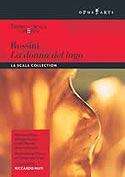|
Back
04/05/2012
Gioacchino Rossini: La donna del lago
June Anderson (Elena), James V of Scotland (Rockwell Blake), Martine Dupuy (Malcolm Groeme), Giorgio Surjan (Douglas of Angus), Chris Merritt (Roderick of Dhu), Marilena Laurenza/Anna Zoroberto (Albina), Ernesto Gavazzi (Serano), Ferrero Poggi (Bertram), La Scala Opera Orchestra and Chorus, Roberto Gabbiani (Chorus Master), Riccardo Muti (Conductor)
Werner Herzog (Stage Director), Carlo Camerini (Musical Director), Maurizio Balò (Set Designer), Franz Blumauer (Costume Designer), Gianni Mantovanini (Lighting Designer), Ilio Catani (Television Director), Gian Carlo Bertelli/Gabriella Pagliani (Executive Producers), Andrea Valioni (Production Director), Angelo Pacchetti (Camera Director), Franco Colombo (Sound Director)
Recorded live at Teatro alla Scala, Milan (June 29, 1992) – 167’ 19
Opus Arte #: OA LS3009 D Booklet in English, libretto in Italian – Subtitles available in English

   
Scotland was one of those far off lands which held great fascination amongst Europeans during the early 19th century. So much, in fact, that a weighted portion of the arts were attuned to using this “wild frontier” as a mystical backdrop: August Bournonville’s ballet, La Sylphide (1836), Felix Mendelssohn’s symphony, Hebrides Overture (1829), François-Adrien Boieldieu’s opera, La Dame blanche (1825), and Gaetano Donizetti’s opera Lucia di Lammermoor (1835) are a handful of examples, and Gioacchino Rossini was no exception. He used Sir Walter Scott’s poem as the foundation for his melodramma, La donna del lago, which premiered at the Teatro San Carlo in Naples on October 24, 1819.
This Opus Arte recording aptly captures the essence of drama, singing, staging and lighting under the direction of noted film director, Werner Herzog. Recorded live at La Scala, the contentious Riccardo Muti splendidly conducts a power house of principals in one of Rossini’s most romantic operas. Known for an emphasized Rossini repertoire, Rockwell Blake is a polished tenor who possesses the vocal demands as Umberto (James V) with brilliantine translation, particularly during his taxing Act II cavatina (“Oh fiamma soave”) in which his roulades are close to remarkable. Similar lyrical difficulties await Elena, but for June Anderson, it appears an effortless venture. No matter the role, no matter the complexity, she commands with the greatest of ease and bathes herself in a sense of rarefied decorum. “Exceptional” can be said about Martine Dupuy as Malcolm Groeme, adding a bountiful and expressive edge to her “recitativo e cavatina”, sliding through notes with comfortable fluidity and rapidity. Native Oklahoman Chris Merritt possesses a burnished flair in his portrayal as the clansman, Roderick of Dhu, and Giorgio Surjan’s Douglas of Angus has a paternal dominance and calming effect as Elena’s father.
For those ballet aficionados, take note: known to “cut and paste”, Rossini also sliced La donna del lago’s Act I closing and reapportioned it to August Bournonville’s 1842 Napoli ballet in the entertainers’ performance from Act I. Maurizio Balò’s sets create the perfect atmosphere even though those familiar with Loch Katrine will find the landscaping of cragged rocks and caves to be more realistically matched with that of Staffa and Fingal’s Cave off the Mull coastline. Authenticity aside, scenic changes are subtly fluid and establish a dark and dank environment, interjected with occasional fog. Gianni Mantovanini’s expressive lighting heightens the opera’s locale. Nearing the opera’s conclusion, faux metal doors open to reveal the lavish and magical/mythical interior of Umberto’s castle that can only be described as “awesome”…this is opera at its best.
Camera shots are a tad conventional and unimaginative, and the chorus staging is so static that it only re-emphasizes the clichéd “stand and deliver” approach. Franz Blumauer’s costumes are enriched with hues of brown, purple and burgundy, adding to the intrinsic value, but because of this dated recording, colors appear slightly dull. Ratcheting up the vivacity of all characters a notch or two would have helped accentuate the dynamics of Rossini’s score tenfold, yet despite the aforementioned, this La Scala performance is still worth watching. Seldom performed, La donna del lago has Rossini immersed in beautiful counterpoint, and extenuated ensembles. It is a lovely piece.
Last month the Royal Opera House announced their plans to present a new production of the opera directed by John Fulljames, slated for May 2013. This is good news for a resurgence of oft neglected works are grabbing the attention of influential movers and shakers and ushering them to the front of the line. We’ll look forward to Britain’s re-discovery of La donna del lago next year.
Christie Grimstad
|